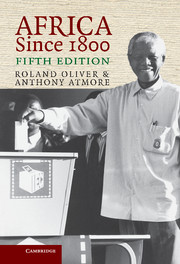Book contents
- Frontmatter
- Contents
- List of Maps
- ONE AFRICA NORTH OF THE EQUATOR
- TWO AFRICA SOUTH OF THE EQUATOR
- THREE THE OPENING UP OF AFRICA: (1) FROM THE NORTH-EAST
- FOUR THE OPENING UP OF AFRICA: (2) FROM THE MAGHRIB
- FIVE WEST AFRICA BEFORE THE COLONIAL PERIOD, 1800–1875
- SIX WESTERN CENTRAL AFRICA, 1800–1880
- SEVEN EASTERN CENTRAL AFRICA, 1800–1884
- EIGHT SOUTHERN AFRICA, 1800–1885
- NINE THE PARTITION OF AFRICA ON PAPER, 1879–1891
- TEN THE PARTITION OF AFRICA ON THE GROUND, 1891–1901
- ELEVEN COLONIAL RULE IN TROPICAL AFRICA: (1) POLITICAL AND ECONOMIC DEVELOPMENTS, 1885–1914
- TWELVE COLONIAL RULE IN TROPICAL AFRICA: (2) SOCIAL AND RELIGIOUS DEVELOPMENTS
- THIRTEEN THE INTER-WAR PERIOD, 1918–1938
- FOURTEEN NORTH AND NORTH-EAST AFRICA, 1900–1939
- FIFTEEN SOUTH AFRICA, 1902–1939
- SIXTEEN THE LAST YEARS OF COLONIAL RULE
- SEVENTEEN THE ROAD TO INDEPENDENCE: (1) NORTH AND NORTH-EAST AFRICA
- EIGHTEEN THE ROAD TO INDEPENDENCE: (2) AFRICA FROM THE SAHARA TO THE ZAMBEZI
- NINETEEN THE ROAD TO INDEPENDENCE: (3) CENTRAL AFRICA
- TWENTY THE LONG ROAD TO DEMOCRACY IN SOUTHERN AFRICA
- TWENTY ONE THE POLITICS OF INDEPENDENT AFRICA
- TWENTY TWO ECONOMICS AND SOCIETY IN INDEPENDENT AFRICA
- TWENTY THREE INTO THE THIRD MILLENNIUM
- EPILOGUE
- Suggestions for Further Reading
- Index
FOUR - THE OPENING UP OF AFRICA: (2) FROM THE MAGHRIB
Published online by Cambridge University Press: 05 June 2012
- Frontmatter
- Contents
- List of Maps
- ONE AFRICA NORTH OF THE EQUATOR
- TWO AFRICA SOUTH OF THE EQUATOR
- THREE THE OPENING UP OF AFRICA: (1) FROM THE NORTH-EAST
- FOUR THE OPENING UP OF AFRICA: (2) FROM THE MAGHRIB
- FIVE WEST AFRICA BEFORE THE COLONIAL PERIOD, 1800–1875
- SIX WESTERN CENTRAL AFRICA, 1800–1880
- SEVEN EASTERN CENTRAL AFRICA, 1800–1884
- EIGHT SOUTHERN AFRICA, 1800–1885
- NINE THE PARTITION OF AFRICA ON PAPER, 1879–1891
- TEN THE PARTITION OF AFRICA ON THE GROUND, 1891–1901
- ELEVEN COLONIAL RULE IN TROPICAL AFRICA: (1) POLITICAL AND ECONOMIC DEVELOPMENTS, 1885–1914
- TWELVE COLONIAL RULE IN TROPICAL AFRICA: (2) SOCIAL AND RELIGIOUS DEVELOPMENTS
- THIRTEEN THE INTER-WAR PERIOD, 1918–1938
- FOURTEEN NORTH AND NORTH-EAST AFRICA, 1900–1939
- FIFTEEN SOUTH AFRICA, 1902–1939
- SIXTEEN THE LAST YEARS OF COLONIAL RULE
- SEVENTEEN THE ROAD TO INDEPENDENCE: (1) NORTH AND NORTH-EAST AFRICA
- EIGHTEEN THE ROAD TO INDEPENDENCE: (2) AFRICA FROM THE SAHARA TO THE ZAMBEZI
- NINETEEN THE ROAD TO INDEPENDENCE: (3) CENTRAL AFRICA
- TWENTY THE LONG ROAD TO DEMOCRACY IN SOUTHERN AFRICA
- TWENTY ONE THE POLITICS OF INDEPENDENT AFRICA
- TWENTY TWO ECONOMICS AND SOCIETY IN INDEPENDENT AFRICA
- TWENTY THREE INTO THE THIRD MILLENNIUM
- EPILOGUE
- Suggestions for Further Reading
- Index
Summary
North-West Africa and the European Powers (1800–1830)
We have seen that at the beginning of the nineteenth century, North Africa west of Egypt consisted of four Muslim states. Three of them – Tripoli, Tunis, and Algiers – were nominally dependencies of the Ottoman empire. The fourth – Morocco – was an independent kingdom. Although all of them traded extensively with western Europe, their religious and cultural connections – as well as a great part of their trade – lay with the eastern Mediterranean on the one hand and with the Muslim states of the western Sudan on the other. All four Maghrib countries regularly imported Sudanese slaves for their own use as soldiers and servants, wives and concubines. In addition, all of them, but especially Tripoli, acted as entrepôts for the re-export of slaves to Egypt and Syria, Turkey and the Balkans. During the first third of the nineteenth century, this basic pattern changed very little. Thereafter, the growing power of western Europe made itself felt in a variety of ways which, in the long term, introduced important changes in the lives of the people of North-West Africa. First, there was the British campaign against the slave trade, waged both in the Mediterranean and in the Atlantic. Next, there was the Greek war of independence (1820–9), fought with the support of the Christian powers. The success of the Greeks drove Muslim rule, and with it the institution of slavery, from a Christian country and provided an example later to be followed by the other Balkan states.
- Type
- Chapter
- Information
- Africa since 1800 , pp. 52 - 62Publisher: Cambridge University PressPrint publication year: 2005



